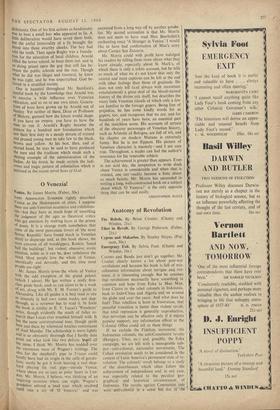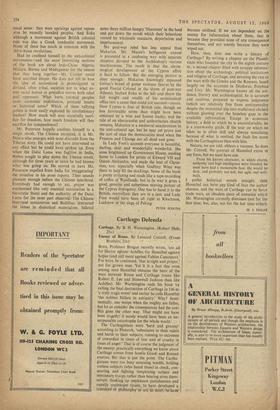Anatomy of Revolution
Cyprus and Makarios. By Stanley Mayes. (Put- nam, 30s.)
CAS1R0 and Banda just don't go together. Mr. Crozier clearly knows a lot about post-war revolutions and because his book is full of mis- cellaneous information about intrigue and vio- lence, it is interesting enough. But he assumes that revolutions necessarily have something in common and hops from Eoka to Mau Mau, from Castro to the rebel colonels in Indonesia, back to Indo-China and Algeria and on around the globe and over the years. And what does he find? That rebellion is born in frustration, that peaceful transition is better than violent revolt, that total repression is generally unproductive, that terrorism can be effective only if it enjoys popular support; any information officer at the Colonial Office could tell us these things
If we exclude the Fidelista movement, the Indonesian colonels, the anti-Communist revolts (Hungary, Tibet, etc.) and, possibly, the Eoka campaign, we are left with a manageable sub- ject —anti-colonial, nationalist movements. The Cuban revolution needs to be considered in the context of Latin America's permanent state of re- volution. The colonels' revolt belongs to a study of 'the disturbances which often follow the achievement of independence and, in any case, was especially related to the peculiar geo- graphical and historical circumstances, of Indonesia. The revolts against Communist rule were anti-colonial in a sense but not in'the' usual sense: they were uprisings against repres- sion by recently invaded peoples. And Eoka although a movement against British colonial rule was also a Greek irredentist movement. None of these has much in common with the Afro-Asian revolutions.
Had he confined himself to the anti-colonial movements—and the most interesting sections of the book are about Indo-China Algeria, Malaya. Burma and Madagascar for the reason that they hang together—Mr. Crozier could have searched deeper. He does not tell us how the idea of nationhood is promulgated in divided, often tribal, societies nor to what ex- tent racial hatred or prejudice moves both rebel and oppressor. What hurts colonial peoples most—economic exploitation, personal insults or historical sores? Which of these rallying points is most easily exploited by revolutionary leaders? How much will men materially sacri- fice for freedom, how much freedom will they sacrifice for independence?
Mr. Patterson happily confines himself to a single revolt. The Chinese excepted, it is Mr. Nehru who emerges with most discredit from the Tibetan story. He could not have intervened to any effect but he could have spoken up. Even when the Dalai Lama was fugitive in India, Nehru sought to play down the Tibetan revolt, although for three years or more he had known what was going on. He moved to have Mr. Patterson expelled from India for 'exaggerating' the situation in his press reports. Tibet sounds pleasant enough before the Chinese interfered. Everybody had enough to eat, prayer was mechanised (the only essential automation in a theocratic State) and the authority of the Dalai Lama for the most part observed; The Chinese destroyed monasteries and Buddhas, instructed the lamas in dialectical materialism, billeted some three million hungry 'liberators' in the land and put down the revolt which their behaviour caused by wholesale massacre, deportation and imprisonment.
No post-war rebel has less appeal than Makarios. Mr. Mayes's belligerent exposé is presented in a confusing way with separate chapters devoted to the Archbishop's various machinations. The result is that the chron- ological development of the Cyprus affair is hard to follow. But the emerging picture is clear enough : Makarios knowingly espoused Grivas's brand of gutter violence (learnt by the good Fascist Colonel in the slums of post-war Athens), backed Eoka to the hilt and threw the full weight and wealth of his ecclesiastical office into a cause that could not succeed—enosis. Now Cyprus is free of British rule, though on less favourable terms than might have been obtained by, a wise and honest leader, and the rule of an obscurantist and authoritarian church remains. Makarios is a mediaeval anachronism in the anti-colonial age. but he may yet prove just the sort of man the democracies need when the Francos and Chiangs are all dead and gone.
In Lady Foot's account everyone is beautiful, darling, dear and wonderfully wonderful. She soon brightened up Government House, sending home to London for prints of Edward VII and Queen Alexandra, and made the best of Christ- mas, too, especially when Godfrey Winn was there to help fill the stockings. Some of the book ib pretty irritating and reads like a tape-recording of coffee at liVO011ands, but in its way it gives a good, genuine and sometimes moving picture of the Cyprus einergency. One has to hand it to the British, marvellous they are in a jam, and Lady Foot would have been all right at Khartoum, Lucknow or'the siege of Peking.
PETER JENKINS



































 Previous page
Previous page